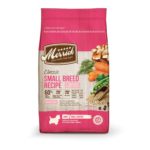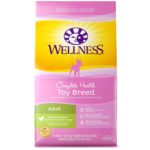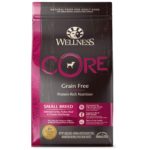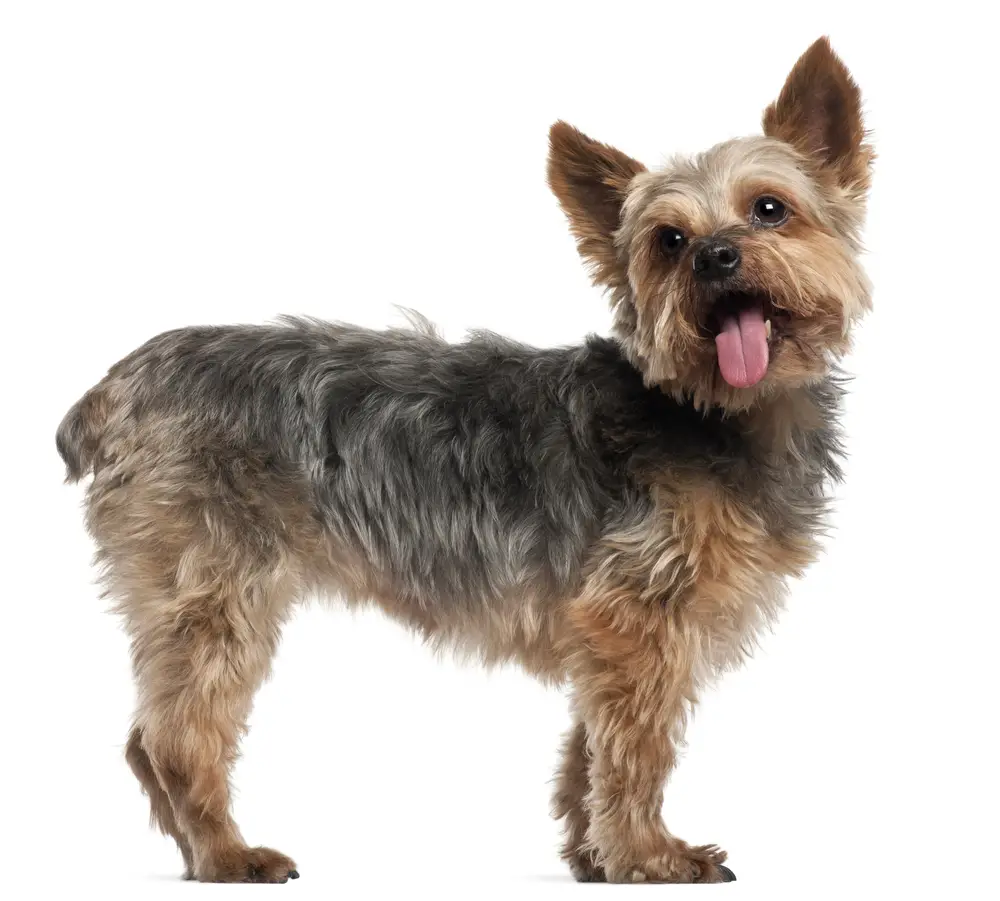Yorkie Feeding Guide
Yorkie Feeding Guide
You want to give your new Yorkie pup the best life possible. That begins with great nutrition to help him stay strong and healthy. We HIGHLY recommend a raw food diet but we understand if the work involved with preparing raw organic foods for your Yorkie isn’t conducive to your life. The right diet can help address many common health concerns among Yorkies like hypoglycemia, vomiting, finicky eating, and refusing to eat. This guide will help you understand your Yorkie’s nutritional needs and answer your questions about what to feed a Yorkie puppy and how often to feed a Yorkie.
How Often Should I Feed My Yorkie?
Yorkies have different feeding needs than larger dogs. Most dog breeds are fine with eating two or even one large meal a day. Yorkies can’t do this. If a Yorkie goes too long without eating, they can experience an upset stomach, vomiting, or hypoglycemia which can cause weakness, seizures, fainting, and even death if it isn’t recognized and treated quickly.
Yorkie Puppy Feeding Schedule
As a puppy, your Yorkshire Terrier’s dietary needs will change rapidly. Until your pup is at least 2.5 pounds and three months old, he isn’t ready for scheduled meals because he may not get enough to eat. Remember that Yorkies tend to eat very small amounts at once. If you try to feed a young Yorkie pup just three times a day, they are likely to experience hypoglycemia or low blood sugar.
For the first three months, let your Yorkie eat whenever they want with Yorkie puppy food always available. Don’t try to limit their intake of food during this time.
Between 3 months and 1 year, your Yorkie is ready for scheduled meal times. Once your pup is old enough, introducing a feeding schedule will make potty training easier by helping you predict when your pup will need to go outside.
Plan for 3-4 meals per day around:
- Morning when your pup wakes up
- Lunchtime
- Early evening
- Late evening about 2 hours before bed
How Often Should I Feed My Adult Yorkie?
By one year and beyond, your Yorkie should be perfectly comfortable with a schedule of 3 to 4 meals per day. This schedule should continue for your Yorkie’s entire life.
The Importance of Snacks

Peanut Courtesy of Bill Pearson
With toy and teacup breeds like the Yorkie, snacking between meals is a must. Giving your pup little treats between regular meals keeps food in their tummy to prevent an upset stomach, vomiting, and hypoglycemic episodes.
Plan to give your Yorkie a variety of treats throughout the day, especially high-protein, low-fat snacks if they suffer from low blood sugar. Avoid rawhide snacks completely because they’re a choking hazard and may damage your pup’s stomach and intestines. Focus on nutritional treats that help supplement your Yorkie’s diet and give him enough energy throughout the day.
How Much Should I Feed My Yorkie?
Figuring out how much to feed your Yorkie puppy isn’t as difficult as it may seem. Start by weighing your Yorkie at the vet’s office or with a kitchen scale to get the most accurate weight.
Next, check what the kibble manufacturer recommends for your dog’s weight. This will be the amount your Yorkie needs per day. Divide that amount into 3-4 regular meals and use a small, dry measuring cup to always measure out your pup’s meals.
Here’s the general guidelines for how much Yorkies need to eat:
- 1/3 to 1/2 cup of kibble daily for Yorkie puppies between 2 and 4 pounds
- 1/3 to 1/2 cup of kibble for adult teacup Yorkies
- 2/3 cup per day for Yorkie adults up to 8 pounds
Yorkie Diet: What to Feed a Yorkie
Once you know how much to feed a Yorkie puppy and when to give them meals, what type of food should you choose? Here’s what you should know about building a healthy Yorkie diet for your new pup.
Dry Kibble Yorkie Food Is Best
Did you know Yorkies are at a very high risk of dental problems like gum disease and early tooth loss? Dry kibble is one of the best ways to protect your Yorkie’s teeth and overall health. When your pup eats dry kibble, it helps stimulate the gums and remove tartar buildup on the teeth. This can reduce the risk of dangerous plaque, gum disease, and tooth infections.
Of course, Yorkshire Terriers are known to be picky about what they eat. Don’t give in by giving your pup table scraps, too many treats, or too much wet dog food. You can help make dry dog food more appealing if necessary.
Tips to make dry kibble more appealing:
- Add a nutritional supplement like Tomlyn to the kibble
- Briefly soak the kibble in warm water
- Drizzle low-sodium chicken or beef broth over the food
How to Choose a Good Yorkie Kibble
Yorkies can be quite sensitive about what they will eat and how their tummy will react. When choosing what to feed a Yorkie puppy, be selective and choose a high-quality kibble brand. Yorkie food should meet these guidelines:
- Small-sized kibble that’s easy to eat
- Natural preservatives which may be listed as tocopherols or a vitamin blend
- No artificial flavoring or coloring which may be linked to behavioral problems
- Traditional meats like meal or whole chicken, duck, rabbit, goose, lamb, beef, turkey, or fish
- Omega-3 fatty acids to support healthy joints as Yorkies are prone to hip and knee problems
- Made in Canada, the USA, or New Zealand
Recommended Yorkie Puppy Food & Adult Food
Here are some high-quality Yorkie puppy food and adult Yorkie kibble we recommend.
 Merrick Classic Small Breed Recipe
Merrick Classic Small Breed Recipe
We like Merrick because they put thought into their kibble formulas. The Merrick small breed recipe is based on deboned chicken and brown rice with no potatoes for a low glycemic option for your Yorkie. Made in the U.S., it has high levels of chondroitin and glucosamine that help support healthy joints and hips. This is an important concern with Yorkies who are prone to hip and knee issues despite their size.
 Wellness Complete Health Toy Breed
Wellness Complete Health Toy Breed
This toy breed kibble features tiny kibble size with chicken to support your Yorkie’s high energy requirements. It’s an all natural formula made with chicken and no corn, soy, wheat, by-products, or artificial flavors, colors, or preservatives. It’s also made in the U.S. As a chicken and brown rice formula, it’s typically very well tolerated by Yorkies.
 Wellness CORE Grain Free Small Breed Formula
Wellness CORE Grain Free Small Breed Formula
If your Yorkie has a sensitivity to grains, the Wellness CORE grain-free formula is a good choice. This Yorkie kibble is based on a recipe of turkey meal, deboned turkey, and chicken meal with all natural ingredients. It also includes extra omega-3 fatty acids, chondroitin, hydrochloride, and glucosamine, all of which support your Yorkie’s joint health.
Nutritional Yorkie Snacks

Lincoln and Diesel Courtesy of Kim Garrod
Your Yorkie will benefit from regular snacks between regular meals. If you’re still potty training your pup, this is easy to fit in by giving rewards when your pup does their business outside.
Make sure the treats you choose are small enough for your tiny Yorkie to enjoy without difficulty. You can supplement his diet with a range of soft treats, hard treats, vegetables and fruits, and the occasional bit of canned food.
The occasional Greenie is great for supporting healthy teeth and gums. We love Natural Balance Limited Ingredient Treats for Yorkies with sensitive tummies. While your Yorkie is still a puppy, NuturVet VitaPet Puppy Daily Vitamins are a great choice. These soft chews offer a full spectrum of the minerals and vitamins your growing pup needs with Omega fats for a shiny coat.
You can also give your pup a variety of veggies and fruits as a healthy, low-calorie snack. Most Yorkies enjoy treats like:
- Banana
- Strawberry
- Sweet potato
- Green beans
- Baby carrots
Don’t be afraid to experiment to see how your Yorkie prefers fruits and vegetables. Some pups like carrots raw and crunchy; others prefer soft, cooked carrots. Fruit can be frozen and enjoyed in the summer or mixed with a bit of low-sugar yogurt and frozen into small treats.
Yorkie Foods to Avoid
Yorkshire Terriers can have very sensitive stomachs and unique nutritional needs given their small size. It can be easy for a Yorkie to eat too much of the wrong types of foods and fail to get the nutrients they need. This can lead to serious problems like life-threatening hypoglycemia, diabetes, kidney problems, or obesity.
Once you develop a nutritional Yorkie diet for your new pup, stick with it. Avoid giving table scraps except the occasional low-fat, low-sugar bite.
People Foods Dangerous to Yorkies
 You probably already know that some people food can be very dangerous to dogs. Onions, chocolate, and grapes, for example, can make a dog of any size sick. With Yorkies, the risk is even greater due to their tiny size and greater risk of kidney and digestive disorders. The amount of chocolate a large dog can eat without symptoms can poison a small Yorkshire Terrier.
You probably already know that some people food can be very dangerous to dogs. Onions, chocolate, and grapes, for example, can make a dog of any size sick. With Yorkies, the risk is even greater due to their tiny size and greater risk of kidney and digestive disorders. The amount of chocolate a large dog can eat without symptoms can poison a small Yorkshire Terrier.
Common foods you should avoid giving your pup include:
- Grapes and raisins
- Chocolate, especially unsweetened baking chocolate
- Dairy products (Organic & Unsweetened Goat Yogurt is OK)
- Any cooked bones
- Salty food
- Garlic and onions due to thiosulphate
- Mushrooms
- Nutmeg
As Yorkie owners ourselves we can attest to thinking and saying that 100% our pup won’t get these foods. But you need to make sure your dog doesn’t accidentally get them by digging through the garbage. So many Yorkies have gotten into food that they shouldn’t have by digging through the garbage can after dinner! Be careful!
Addressing Hypoglycemia in Your Yorkie Diet
 Yorkies are very small and at a high risk of hypoglycemia or low blood sugar. This condition may lead to very sudden hypoglycemic episodes that happen when your puppy’s blood sugar levels plummet.
Yorkies are very small and at a high risk of hypoglycemia or low blood sugar. This condition may lead to very sudden hypoglycemic episodes that happen when your puppy’s blood sugar levels plummet.
Hypoglycemia can be a serious and life-threatening condition, especially when your Yorkie is young. Hypoglycemia can be triggered by stress which can happen when your Yorkie is dealing with changes in his routine or even gets too cold. Yorkies can’t eat a lot at once, either. They’re also known as finicky eaters. Unlike larger breeds, a Yorkie pup can only take a few bites at a time yet remains very active. This can lead to a rapid drop in blood sugar levels.
A good way to manage your Yorkie’s blood sugar is with dietary supplements while they’re young. High-protein, high-calorie treats between meals are a good choice or you can add a meal topper.
The Tomlyn High Calorie Nutritional Gel for Puppies is great to add to your pup’s meals or as a treat between meals. EnerCal High Calorie Nutrition Supplement is also a good choice to help manage your pup’s hypoglycemia.
What to Do If Your Yorkie Refuses to Eat
It’s not uncommon for Yorkshire Terriers to refuse to eat or show a lack of appetite. Because your Yorkie only weighs 4-8 pounds fully grown, it’s important to address any appetite issues right away as your pup can’t afford to lose weight.
Common appetite problems with Yorkies include:
- Suddenly refusing to eat anything, including table scraps
- Picky eating
- Decreased appetite
- Refusal to eat kibble
If your Yorkie refuses to eat kibble, don’t just assume they’re being finicky. Some Yorkies slowly develop a distaste for a certain type of kibble or it may be sudden.
Consider whether you have recently switched brands. When switching to a new brand, it’s important to do it slowly by mixing in a bit of new food with the old, increasing the ratio of new food over a period of several weeks. Yorkies tend to be sensitive to sudden changes in diet and it may cause digestive problems, diarrhea, or refusal to eat if it’s done too suddenly.
If your Yorkie is eating but only tiny amounts and doesn’t seem very interested in the food, try making it more appealing by adding a tiny bit of broth or a nutritional supplement.
Has your Yorkie’s appetite just decreased? This can happen for a few reasons:
- Dogs eat less food when it’s hot, probably due to a decrease in activity. Don’t worry as long as your Yorkie continues to drink plenty of water.
- He’s full. Make sure you aren’t giving your pup too much to eat. Many dogs naturally stop eating when they’re full to maintain their weight.
- Medical conditions. After ruling out everything else, have a talk with your vet. Your Yorkie may have a health issue that needs to be addressed such as pancreatitis which may happen if your Yorkie eats a fatty meal.

